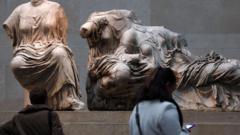The ongoing negotiations regarding the Parthenon Sculptures, known as the Elgin Marbles, appear to be reaching a critical point, according to former Greek official Prof. Irene Stamatoudi. She informed the BBC that discussions have enhanced in recent days, suggesting that a compromise for the return of the artifacts, taken from Athens over two centuries ago, might soon be realized.
The sculptures, currently exhibited in the British Museum, have sparked a longstanding diplomatic controversy between Greece and the UK. Greece asserts that the sculptures were taken unlawfully, while the British Museum insists their acquisition was legal. Recent talks, which have reportedly been in motion since 2021, have gained renewed attention following a meeting between UK Labour leader Sir Keir Starmer and Greek Prime Minister Kyriakos Mitsotakis, despite the UK government stating the issue was not on its agenda.
Prof. Stamatoudi, who served as an advisor to Greece’s culture minister during past negotiations, expressed optimism about reaching a deal, although she cautioned that it might not yet be finalized. She suggested that Greece's proposal includes a "cultural, strategic partnership" that would involve sending other antiquities to London, compensating for any gaps left by the Elgin Marbles' return.
Mitsotakis, who has prominently advocated for the return of the sculptures, is said to intend to re-engage with political leaders in the UK following past diplomatic tensions, particularly after a meeting between Mitsotakis and Sunak was canceled last year over this very issue. The Labour Party has also indicated openness to a potential loan arrangement, diverging from the previous government’s firm stance against any return of the pieces.
Although discussions regarding the possible relocation of the Elgin Marbles are ongoing, legal and operational barriers remain. The British Museum Act of 1963 legally divests the museum of the ability to permanently remove items from its collection, complicating any efforts for a full return. Nevertheless, the museum’s trustees are purportedly considering a special loan agreement, a notion Greece has historically resisted, claiming it would validate British ownership over the artifacts.
These discussions highlight the cultural significance the Parthenon Sculptures hold for Greece, representing a crucial aspect of its national identity and heritage. The outcome remains to be seen, but both parties may be inching closer to a resolution that could redefine their historical ties.
The sculptures, currently exhibited in the British Museum, have sparked a longstanding diplomatic controversy between Greece and the UK. Greece asserts that the sculptures were taken unlawfully, while the British Museum insists their acquisition was legal. Recent talks, which have reportedly been in motion since 2021, have gained renewed attention following a meeting between UK Labour leader Sir Keir Starmer and Greek Prime Minister Kyriakos Mitsotakis, despite the UK government stating the issue was not on its agenda.
Prof. Stamatoudi, who served as an advisor to Greece’s culture minister during past negotiations, expressed optimism about reaching a deal, although she cautioned that it might not yet be finalized. She suggested that Greece's proposal includes a "cultural, strategic partnership" that would involve sending other antiquities to London, compensating for any gaps left by the Elgin Marbles' return.
Mitsotakis, who has prominently advocated for the return of the sculptures, is said to intend to re-engage with political leaders in the UK following past diplomatic tensions, particularly after a meeting between Mitsotakis and Sunak was canceled last year over this very issue. The Labour Party has also indicated openness to a potential loan arrangement, diverging from the previous government’s firm stance against any return of the pieces.
Although discussions regarding the possible relocation of the Elgin Marbles are ongoing, legal and operational barriers remain. The British Museum Act of 1963 legally divests the museum of the ability to permanently remove items from its collection, complicating any efforts for a full return. Nevertheless, the museum’s trustees are purportedly considering a special loan agreement, a notion Greece has historically resisted, claiming it would validate British ownership over the artifacts.
These discussions highlight the cultural significance the Parthenon Sculptures hold for Greece, representing a crucial aspect of its national identity and heritage. The outcome remains to be seen, but both parties may be inching closer to a resolution that could redefine their historical ties.






















